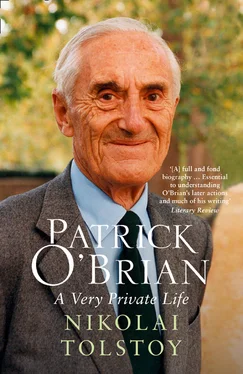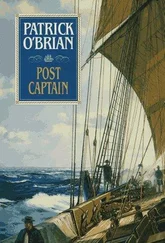The extent to which well-intentioned publishers occasionally made up for Patrick’s dislike of supplying personal data is illustrated by a comment made by my mother in 1952: ‘Irish Writing came with N.L.T.P.T.R.A.;[fn21] very surprised to find biographical notes after I’d refused them because P. doesn’t like it.’ Fortunately, this issue remained for the present a minor irritation. Two overriding concerns exercised Patrick and my mother throughout this critical period in their lives. How was he to relaunch his literary career? And, still more pressingly, how might the impoverished couple survive financially?
II CONTENTS Cover Title Page PATRICK O’BRIAN A Very Private Life Nikolai Tolstoy Copyright Dedication Epigraph Preface I Collioure and Three Bear Witness II The Catalans III New Home and New Family IV Voyages of Adventure V In the Doldrums VI A Family Man VII Master and Commander VIII The Green Isle Calls IX Pablo Ruiz Picasso X Shifting Currents XI Muddied Waters XII Travails of Existence XIII Family Travails XIV The Sunlit Uplands XV Epinician Acclaims XVI Triumph and Tragedy XVII Melmoth the Wanderer Envoi Appendix A: Collioure: History and Landscape Appendix B: Patrick and His First Wife Elizabeth Appendix C: Patrick’s Sailing Footnotes Notes Index Acknowledgements About the Author Also by Nikolai Tolstoy About the Publisher
The Catalans CONTENTS Cover Title Page PATRICK O’BRIAN A Very Private Life Nikolai Tolstoy Copyright Dedication Epigraph Preface I Collioure and Three Bear Witness II The Catalans III New Home and New Family IV Voyages of Adventure V In the Doldrums VI A Family Man VII Master and Commander VIII The Green Isle Calls IX Pablo Ruiz Picasso X Shifting Currents XI Muddied Waters XII Travails of Existence XIII Family Travails XIV The Sunlit Uplands XV Epinician Acclaims XVI Triumph and Tragedy XVII Melmoth the Wanderer Envoi Appendix A: Collioure: History and Landscape Appendix B: Patrick and His First Wife Elizabeth Appendix C: Patrick’s Sailing Footnotes Notes Index Acknowledgements About the Author Also by Nikolai Tolstoy About the Publisher
When a man wakes in the night and finds his head filled with remorse and bitter, old regret, if he chose he could reflect that no other man in the world would be suffering precisely that remorse nor exactly that regret … Of course, he would not choose to do so, for he would be too busy dodging about in his mind, trying to escape – unless, that is, he were occupied with feeling the wound to see how much it still hurt and trying to persuade himself that there was virtue in mere remorse.
Patrick O’Brian, ‘The Voluntary Patient’
With Secker & Warburg’s acceptance of Three Bear Witness in February 1951, Patrick had reason to feel confidence in his regenerated career as a writer. Not only was it his first adult novel, but the first novel he had published since Hussein in 1938. At last he had emerged from the creative chasm inflicted by the War with his accompanying personal crises of divorce and remarriage, followed by the dire impact of his troubled exile in North Wales.
At the same time, he had come to feel he had finally shed the oppressive effect of his father’s dark shadow. In the summer of 1949, shortly before his and my mother’s departure from Cwm Croesor, a solitary walk brought him to a precipitous, sunless valley amidst the mountains. ‘When I was going up to Llyn yr Adar there seemed to be a thing at the top of the high black barren cliff that forms the backside of Cnicht.’ What it was he found hard to identify:
I watched it for some time, but it did not move; and all the way along the valley I kept looking up, but it seemed immobile … When I came back it was still there. Gargoyle-ish, brooding, jutting out, small in the distance, but menacing and in control. The next time I went up to the lake it was not there.
This uncanny experience occurred when Patrick had attained the nadir of his increasingly frustrating Welsh exile, shortly before he made the dramatic decision to escape to sunny France. Returned from his walk, he wrote the powerful story ‘Naming Calls’, which was later published in The Last Pool . It recounts the terrifying experience of a writer who withdraws to a small house set in the sinister valley explored by Patrick. The tale concludes with the destruction of the frantic outcast, when a raging storm drives up the valley and dislodges ‘a vast mass of rock’ from the mountainside above: ‘Abel shrieked high and the door burst open, swinging wide and shuddering on its hinges.’ The elemental force of the tempest is unmistakably intended as an evocation of the man’s father, ‘a formidable, roaring tyrant’, whose spirit he had inadvertently conjured forth.
It is clear that Patrick had come to associate his oppressive malaise with his frequently bullying giant of a parent, who had repeatedly afflicted him with demoralizing terror during his infancy. Now, however, when in Three Bear Witness he adverted to the same uncanny episode, it was to dismiss it comfortingly as an unpleasant memory banished to the past. After a spasm of apprehension, ‘I felt positively merry – a glance upwards showed it there, of course, an insignificant rock, though curious. When I had finished my sandwiches it was gone.’[1]
Unfortunately, the couple’s financial predicament remained as alarming as ever. Secker’s acceptance of Three Bear Witness brought only the briefest respite. An advance of £100 was contracted on 1 February 1951, half on acceptance and half at publication. Sympathetic to his client’s worrying predicament, Spencer Curtis Brown charitably forwarded him the second £50, which was not otherwise due to be paid for at least another year. ‘Even agents can have kind hearts on occasion,’ he wrote to the publisher, who failed however to reimburse Curtis Brown in turn. Sadly, Curtis Brown’s generosity was all but negated by the rapacious grasp of government. As my mother learned: ‘C.B. now has to deduct income tax at 9/- in the £: with that & his 10% Testimonies £100 has shrunk to £49.’
While the prospect of his novel’s publication went far to restore Patrick’s self-esteem, until it was published openings for further literary employment remained constricted.[fn1] Shortly before their move to France, Patrick confessed to Warburg that he had ‘written himself out’, so far as short stories were concerned. Gradually, however, the colourful turbulence of Collioure brought him a fresh harvest of imaginative themes. During the year following November 1950, he composed no less than thirty-three short stories. Many were set in and around Collioure, drawing on his observations of the town, its inhabitants, customs and traditions.
Why then did he not launch at once into the work on Southern France, which he had discussed with Fred Warburg, and for which an option was stipulated in the contract for Three Bear Witness ? It looks as though one of his recurrent failures of confidence inhibited his undertaking a full-scale book during the anticlimactic year which stretched between his completion of Three Bear Witness and its publication in the spring of 1952. Ever his own sternest critic, it was about this time that he penned this frank assessment of his approach to writing:
I often, or at least sometimes, like my writing when I am doing it, but so much more often I feel uneasy and ashamed afterwards. All the affectations, poses and ‘special’ attitudes stare out – hideously pimpled youth smirking in the looking-glass yet finds his confidence decay and enters a public room fingering himself – and often the ‘clever pieces’ appear shallow and dull as well as quite unauthoritative, the ‘poetic touches’ arty, long-winded and false, and dreadfully often the whole thing comes to pieces at the end – shuffles off in the lamest manner possible. This is because I think of a good beginning, grow excited and embark upon the story, taking it for granted that it will finish itself.
Читать дальше












